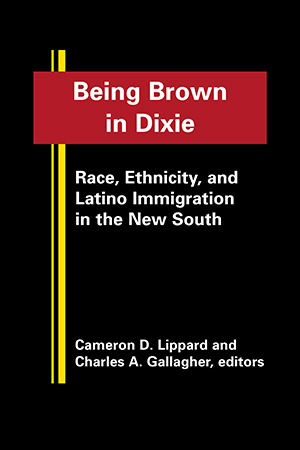Cameron D. Lippard and Charles A. Gallagher, editors
How has the dramatic influx of Latino populations in the US South challenged and changed traditional conceptions of race? Are barriers facing Latinos the same as those confronted by African Americans? The authors of Being Brown in Dixie use the Latino experience of living and working in the South to explore the shifting complexities of race relations. Systematically considering such central issues as hiring, housing, education, and law enforcement, they emphasize the critical social and policy implications for new gateway communities and for our society as a whole.
Cameron D. Lippard is associate professor of sociology at Appalachian State University. Charles A. Gallagher is professor of sociology at La Salle University.
"Achieves both a broad range of topics and a well-defined argument.... A fine collection of papers on a subject that cannot be ignored."—Tekla Nicholas, Bulletin of Latin American Research
"The combination of research topics, varied geographic foci and methodology provide the reader with an excellent grasp of the intricate tapestry of the relationships between Latinos and the region's economic changes, racial framework and institutions, as well as a more nuanced picture of the south in general."—Belisa Gonzalez, Latino Studies
"An important contribution." —John Iceland, American Journal of Sociology
"Significantly advance[s] our understanding of the Latino immigrant impact on the U.S. South.... Essential reading."—Rebecca LeFebvre, Norteamérica
"An intriguing collection.... Whilst a primary strength of the book lies in raising critical questions in relation to widespread racial(-ized) prejudice and systematic forms of discrimination, it also succeeds in showing how—even in the face of considerable (potential for) conflict—members of different racial(-ized) groups ... can find ways towards more mutual respect and cooperation."—Andreas Pollmann, Ethnic and Racial Studies
"Should be highly useful not only to scholars of race and ethnicity in general, but to social scientists and politicians, as well as community leaders and teachers, involved in issues related to Latino immigration in the South."—Rachel Madsen, Sociation Today
"In both its breadth and depth, this book demonstrates the achievements of recent scholarship on the importance of Latino immigration to the South and how it can open new vistas about the future of intergroup relations in the United States.... A valuable resource."—Brian L. Rich, Transylvania University






